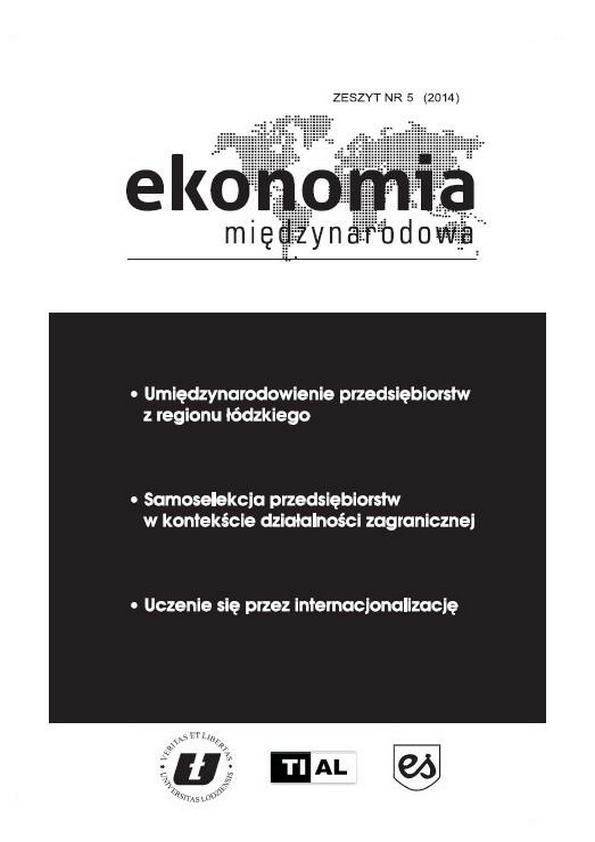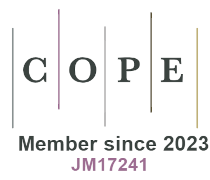Znaczenie działalności eksportowej dla przedsiębiorstw z województwa łódzkiego – wyniki badania ankietowego
DOI:
https://doi.org/10.18778/2082-4440.05.02Słowa kluczowe:
produktywność, województwo łódzkie, learning-by-exportingAbstrakt
Artykuł opisuje problem efektów uczenia się przez eksport (LBE). Pierwsza część tekstu skupia się na przedstawieniu zagadnienia w teorii. Z kolei druga część ujmuje je w odniesieniu do przedsiębiorstw przemysłowych z województwa łódzkiego. Wspierano się wynikami badania ankietowego przeprowadzonego wśród firm z regionu. Wyniki badań wskazują, iż uczenie się nie jest priorytetem eksporterów, jednak istnieją przesłanki, iż efekty LBE mogą objawiać się w dłuższym okresie.
Bibliografia
Bernard A.B., Eaton J., Jensen J.B., Kortum S. (2003), Plants and Productivity in International Trade, American Economic Review, Vol. 93, Nr 4, s. 1268–1290.
Google Scholar
DOI: https://doi.org/10.1257/000282803769206296
Bernard A.B., Redding S.J., Schott P.K. (2006), Multi-Product Firms and Trade Liberalization, NBER Working Paper No. 12782, Cambridge, MA.
Google Scholar
DOI: https://doi.org/10.3386/w12782
Bernard A.B., Redding S.J., Schott P.K. (2010), Multi-Product Firms and Trade Liberalization, http://mba.tuck.dartmouth.edu/pages/faculty/andrew.bernard/ [data dostępu: 28 stycznia 2014 r.].
Google Scholar
DOI: https://doi.org/10.2139/ssrn.1475707
Cassiman B., Golovko E. (2007), Innovation and the Export-productivity Link, CEPR Discussion Papers 6411, Londyn.
Google Scholar
DOI: https://doi.org/10.2139/ssrn.1003366
Castellani, D. (2002), Export Behaviour and Productivity Growth: Evidence from Italian Manufacturing Firms, Weltwirtschaftliches Archiv, Vol. 138(4), s. 605–628.
Google Scholar
DOI: https://doi.org/10.1007/BF02707654
De Loecker J. (2007), Do exports generate higher productivity? Evidence from Slovenia, Journal of International Economics, Vol. 73, s. 69–98.
Google Scholar
DOI: https://doi.org/10.1016/j.jinteco.2007.03.003
Fernandes A.M., Isgut A.E. (2005), Learning-by-doing, learning-by-exporting, and productivity : evidence from Colombia, Policy Research Working Paper Series 3544, The World Bank, Waszyngton, DC.
Google Scholar
DOI: https://doi.org/10.1596/1813-9450-3544
Fernandes A.M., Isgut A.E. (2007), Learning-by-Exporting Effects: Are They for Real?, MPRA Paper 3121, University Library of Munich, Monachium.
Google Scholar
DOI: https://doi.org/10.2139/ssrn.982231
Greenaway D., Yu Z. (2004), Firm-level interactions between exporting and productivity: Industry specific evidence, Review of World Economics, Vol. 140(3), s. 376–392.
Google Scholar
DOI: https://doi.org/10.1007/BF02665981
Hagemejer J. (2006), Czynniki wpływające na decyzję przedsiębiorstw o eksporcie. Analiza danych mikroekonomicznych, [w:] „Bank i Kredyt”, Vol. 37, No. 7, s. 30–43.
Google Scholar
Kasahara H., Lapham B. (2008), Productivity and the Decision to Import and Export: Theory and Evidence, CESifo Working Paper No. 2240.
Google Scholar
Kraay, A. (1999), Exports and Economic Performance: Evidence from a Panel of Chinese Enterprises, mimeo World Bank, Waszyngton, DC.
Google Scholar
Maggioni D. (2010), Learning by exporting in Turkey: an investigation for existence and channels, MPRA Paper 37157, University Library of Munich, Monachium.
Google Scholar
Mayer T., Melitz M.J., Ottaviano G. (2009), Market Size, Competition, and the Product Mix of Exporters, working paper.
Google Scholar
DOI: https://doi.org/10.2139/ssrn.1692595
Melitz M.J. (2003), The Impact of Trade on Intra-industry Reallocations and Aggregate Industry Productivity, Econometrica, Vol. 71, Nr 6, s. 1695–1725.
Google Scholar
DOI: https://doi.org/10.1111/1468-0262.00467
Melitz M.J., Ottaviano G. (2008), Market Size, Trade, and Productivity, Review of Economic Studies, vol. 75, s. 295–316.
Google Scholar
DOI: https://doi.org/10.1111/j.1467-937X.2007.00463.x
Redding S.J. (2010), Theories of Heterogeneous Firms and Trade, CEP Discussion Paper No. 994.
Google Scholar
DOI: https://doi.org/10.3386/w16562
Salomon R., Jin B. (2008), Does knowledge spill to leaders or laggards? Exploring industry heterogeneity in learning by exporting, Journal of International Business Studies, Vol. 39, s. 132–150.
Google Scholar
DOI: https://doi.org/10.1057/palgrave.jibs.8400320
Trofimenko N. (2005), Learning by Exporting: Does It Matter Where One Learns? Evidence from Colombian Manufacturing Firms, Kiel Working Paper No. 1262, Kiel Institute for World Economics, Kilonia.
Google Scholar
Verhoogen E.A. (2008), Trade, Quality Upgrading and Wage Inequality in the Mexican Manufacturing Sector, Journal of International Economics, Vol. 65, s. 1–20.
Google Scholar
DOI: https://doi.org/10.2139/ssrn.1000909
Wagner J. (2005), Exports and Productivity: A Survey of the Evidence from Firm Level Data, University of Luneburg Working Paper Series in Economics, Nr 4.
Google Scholar
DOI: https://doi.org/10.2139/ssrn.740252
Yeaple S.R. (2005), A simple model of firm heterogeneity, international trade, and wages, Journal of International Economics, Vol. 65, s. 1–20.
Google Scholar
DOI: https://doi.org/10.1016/j.jinteco.2004.01.001
Pobrania
Opublikowane
Jak cytować
Numer
Dział
Licencja

Utwór dostępny jest na licencji Creative Commons Uznanie autorstwa – Użycie niekomercyjne – Bez utworów zależnych 4.0 Międzynarodowe.









